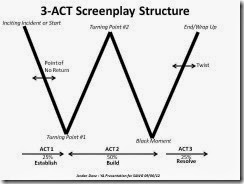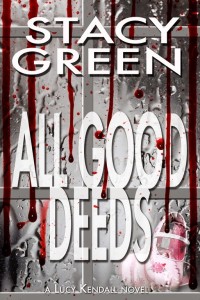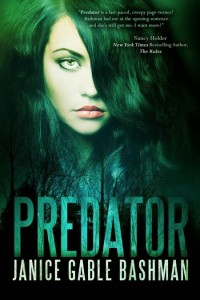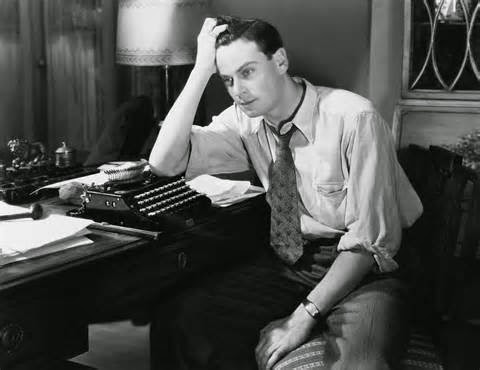
On Monday, guest Steven James had an excellent post on “Fiction Writing Keys for Non-Outliners.” I loved reading his thoughts on trusting the fluidity of the process and chasing after rabbit trails. I can relate to this as a writer. On Tues, our esteemed TKZ contributor, P. J. Parrish, expressed an argument in favor of more structure in her subtle post, “Sometimes You Gotta Suck It Up & Write The Darn Outline” in which she wrote about her love/hate relationship with outlining. These arguments got me thinking about my own process that has evolved over the years.
I started out as a total “pantser,” meaning I came up with a vague notion of characters or a story idea, then started writing to see where it would go. In general, I found this to be liberating and it unleashed my inner story teller, but I found (over time) that I ran out of gas about half way through and hit a wall. I always finished the project. I believe it’s important to finish what you start, if for no other reason than to learn how to get out of tight corners. There’s a true feeling of accomplishment to salvage a story that seemed to be headed for a dead end, and through practice, I learned what pitfalls to avoid. But as a writer under contract, I realized it would be a better use of my time to do some advance thinking on structure, rather than hoisting a shovel to shore up plot holes.
So I found a hybrid method that satisfied my “pantser” free spirit yet provided enough structure to serve as a guidepost – my lighthouse in the fog. I posted a more detailed presentation on TKZ HERE, but I wanted to highlight what this method does for me now.
NOTE: A word of caution on any detailed plotting method: A plot structure can become rigid and restrictive if it inhibits the author’s exploration into a new plot twist or character motivation. As Steven James said, some rabbit trails should be explored. For me, this is the fun of storytelling – to uncover a hidden gem of creativity.
When I’m first developing an idea, I break it down into turning points (the 3-Act Screenplay Structure “W”) to get a general notion on structure. It helps me simplify the plotting/outline method into 5 turning points (the W). I can handle 5 things. I use this to write proposals and brainstorm with my crit group for their plots or mine. Rather than getting bogged down by character backstory or other details, I focus on “big ticket” plot movements to provide some substance.
The transition scenes between the turning points are still a mystery that can be explored, but in a synopsis, I can provide enough “meat to the bone” for an editor to get the idea and pair it up with a multi-chapter writing sample. Once I start writing the rest of the book, I can still explore rabbit holes and surprise character motivation twists to embellish the framework I’ve started with. I get my proposal out to my agent (with writing sample, synopsis and pitch) and keep working on current material. While I’m waiting to hear on a sale, I can set the material aside because I have a synopsis to act as a guidepost when I can get back to it. This method has also helped me plot out a whole series, to build onto the storylines (over a series of novels) and ramp up the stakes.
Focusing on turning points from the beginning (before I commit to the writing) has inspired me to spin major plot twists and “play with” the options I should consider. I can reach for complete 180 spins in a “what if” way. As an example of 180 degree turns, I’ve been inspired by the TV show CSI Vegas this season. Many of the episodes are so well written, they make a 180 turn at every commercial break and hit their marks with great twists. I’ve enjoyed this season so much that I record and go back over the plot by taking notes, to see how the writers developed the story. That’s what really good turning points can do for a book/TV show. They pull the reader/viewer into the story and challenge them to figure out where the plot is going. Who dunnit?
So I’m a reformed pantser who has found a way to keep a sense of free spirit, yet write with a framework when I’m ready to go. I feel more efficient, but I still have the flexibility to explore rabbit trails and trust my natural story telling ability.
I’d like to hear from you: How do you handle rabbit trails? Do you put all the work up front in the form of a detailed outline, or do you prefer a lighter touch to “discover” something as you write? Are you a hybrid plotter/outliner too?
Category Archives: Jordan Dane
Let’s Discuss the Latest on Self-Publishing Resources
Jordan Dane
@JordanDane
Just a short blog post today from me, but I could really use your help. I’m interested in hearing from those who have good resources for self-publishing regarding formatting and sales ops. Since we have a wealth of experienced followers on this blog, I’d like to hear your thoughts to broaden my horizons. Self-publishing is a HUGE topic, but I’d like our chat to be focused on the questions below.
Here are some of the things I’m interested in getting updated on:
1.) Do you have format service companies or individuals you would recommend?
I’d like to find a one-stop company or individual who formats for all the major sales outlets: Amazon, B&N, ITunes, Kobo. Please share your experiences.
2.) What format add-ons do you recommend (as far as website links or features) that have worked for you? (ie website links, mailing list signups, retailer sales links, etc.) In other words, what marketing tools do you add to your formats that you would recommend?
3.) Within your format of text, are there navigational aspects or enhancements (bells & whistles) you would recommend to add to your content? (ie chapter list with links to easily navigate within your book, audio enhancements, etc. Some of these might be costly, but I’d love to hear any new ideas.)
4.) Does anyone have a special format service provider for Lightning Source? I hear the LS set up is expensive and corrected proofs must be reloaded. This could be cumbersome, but I hear the quality is good and LS does hardcovers with different distribution outlets. It’s something I’d like more information on.
5.) Regarding sales outlets, are there any new players worth considering?
If you have a site, please post it and comment as to why you would recommend it. I’m thinking the sites mentioned above encompass the majority of sales, but if you’ve found other sites worth considering, I’d love to hear about them.
6.) Has anyone added sales/purchase capability onto their website where a reader could buy from the author directly? I’ve seen this done via a secured PayPal app, but had concerns on sales tax and shipping. I wondered how this worked (for anyone who has experience).
7.) I know promotion is a big topic, but for the purposes of discussion and brevity, what one promotional activity or service provider do you use without fail and would recommend to anyone?
I haven’t mentioned editing, because again that is a must have for any author and the cost can have a wide range, depending on services needed from line edits to book doctoring. I also haven’t asked about book cover designers. I work with Croco Designs and love Frauke Spanuth. But feel free to mention any other self-publishing services you’ve found helpful.
I bow to your infinite wisdom, TKZers. Please share your thoughts.
How to Successfully Put a New Spin to an Old Tale
I’m excited to have Janice Gable Bashman as my guest today at TKZ. Her latest release (now available) is PREDATOR with Month9Books. Stunning cover. Janice is a Bram Stoker nominated author and editor of the prestigious International Thriller Writers (ITW) publication, The Big Thrill, and she serves on ITW’s board of directors as the Vice President of Technology. Today Janice will share her tips on how to put a new spin to an old tale and make it fresh. Take it away, Janice—and welcome.
Janice Gable Bashman
I love when an author takes science to its extreme. Often it goes horribly wrong. I devoured early works by Michael Crichton (Jurassic Park and Sphere) and James Rollins (Deep Fathom and Amazonia) during my youth. The books were popular and it’s easy to see why. The authors took old tales—dinosaurs roaming the earth, a 300 year-old space ship at the bottom of the ocean, an ancient power causing havoc in a modern-day world, and a mysterious disease threatening to wipe out the population with the cure hidden deep inside the jungle—and put new spins on them. The stories were fresh and exciting and loved by many. They still are.
So how do you put a new spin on an old tale when readers think they already know how it’s supposed to go and there isn’t anything they can possibly learn?
You have to think outside the box, as the saying goes.
In my novel Predator, I give the werewolf legend a couple of new spins by introducing the Benandanti (an actual folkloric belief that certain families of Italy and Livonia were werewolves who fought against evil) as well as a modern scientific approach to mutation and the science of transgenics. But I take these new spins a step further. The science is used to its extreme, in some cases it goes horribly wrong, and the Benandnati may not be what they seem. How did the Benandanti end up alive today and living in Ireland and the United States? What are they up to and why? Are they good or evil?
By raising new questions, upping the stakes, and using science in a new way, I was able to put a new twist on the werewolf tale. Writing about science or werewolves or super soldiers is nothing new. They are simply a premise. It’s the story elements that give these topics a new twist and makes them fresh and exciting. And it’s the characters that bring them alive.
So how can you do the same with your premise?
Can you combine elements of different genres to create a new idea?
Can your protagonist see things from a perspective different than you ever thought possible?
Can you use your novel’s physical world to put a fresh spin on things?
Can you mash together two concepts to create something new?
Think about it. It’s possible. It’s up to you and your imagination to wow the reader with a new take on an old tale. I know you can do it.
So TKZers—what novels do you love that put a new spin on an old tale, and why?
———————————————————————————–
Janice Gable Bashman is the Bram Stoker nominated author of PREDATOR (Month9Books 2014) and WANTED UNDEAD OR ALIVE (w/NEW YORK TIMES bestseller Jonathan Maberry) (Citadel Press 2010). She is editor of THE BIG THRILL (International Thriller Writers’ magazine). Her short fiction has been published in various anthologies and magazines. She is a member of the Society of Children’s Book Writers and Illustrators, Mystery Writers of America, Horror Writers Association, and the International Thriller Writers, where she serves on the board of directors as Vice President, Technology.
Links:
Website: https://www.janicegablebashman.com
Facebook: https://www.facebook.com/JaniceGableBashmanAuthor
Twitter: http://twitter.com/janicebashman
Book buy links for Janice:
http://amzn.to/1xCYQwO
http://bit.ly/ZsJgFX (Barnes & Noble)
Guest Author Stacy Green on Creating a Sociopathic Character
Jordan Dane
@JordanDane
Swiss psychologist Carl Yung believed our conscious minds possessed four major archetypes: the self, the shadow, the anima, and the persona. Naturally, as a thriller author, the shadow interests me the most.
The shadow holds our repressed ideas and desires, our weaknesses and the darker side of our psyche. Some people it is this shadow side that comes into play when seemingly good people go bad.
But what about the sociopath? I’m not talking about the serial killers we’ve all studied (I refer to those as psychopaths), but those individuals who walk among us every day with their own agenda, no remorse, and a frightening ability to manipulate everyone they come in contact with. Are these people simply more controlled by their shadow side? More importantly, what’s my shadow side like?
In creating my character, Lucy Kendall, I studied sociopaths. Lucy doesn’t believe she’s a bad person and she doesn’t even consider herself a killer. After all, her targets are repeat pedophiles who keep being turned out by the justice system. She’s in the right, and she’s doing society a favor.
Of course, anyone who believes that has to have some kind of sociopathic traits, right? In research for and creating Lucy, I started thinking about my own shadow side and exactly how close I was to the dark side of life.
According to the ICD 10, the following are considered sociopathic traits. Presence of three or more qualifies for a diagnosis of antisocial personality disorder, aka as sociopathy.
1. Callous unconcern for the feelings of others.
2. Gross and persistent attitude of irresponsibility and disregard for social norms, and obligations.
3. Incapacity to maintain enduring relationships, though having no difficulty in establishing them.
4. Very low tolerance to frustration, a low threshold for discharge of aggression, including violence.
5. Incapacity to experience guilt or to profit from experience, particularly punishment.
6. Markedly prone to blame others or to offer plausible rationalization for the behavior that has brought the person into conflict with society.
The DSM IV is another diagnostic tool and defines sociopathic traits as:
1. Failure to conform to social norms with respect to lawful behaviors as indicated by repeatedly performing acts that are grounds for arrest
2. Deception, as indicated by repeatedly lying, use of aliases, or conning others for personal profit or pleasure
3. Impulsiveness or failure to plan ahead
4. Irritability and aggressiveness, as indicated by repeated physical fights or assaults
5. Reckless disregard for safety of self or others
6. Consistent irresponsibility, as indicated by repeated failure to sustain consistent work behavior or honor financial obligations
7. Lack of remorse as indicated by being indifferent to or rationalizing having hurt, mistreated, or stolen from another
A) The individual is at least age 18 years.
B) There is evidence of conduct disorder with onset before age 15 years.
C) The occurrence of antisocial behavior is not exclusively during the course of schizophrenia or a manic episode. SOURCE
So here’s the thing: I don’t fit that list, thankfully. But I’ve certainly had my moments when I realize I’m incredibly callous and most people would consider me a terrible person if they knew what I was really thinking.
Example: my daughter is a competitive swimmer, and she is able to practice in a very new and nice facility our tax dollars paid for. And every practice, when I see swim lesson kids taking up lanes in the pool, I get angry. I see these kids as space fillers who crowd the pool for team kids who need room to move. And I have little compassion for the parents who equally crowd the window space and get excited when little Johnny splashes a few feet and doesn’t drown. It outright annoys me. And even worse, I’m sure most people within my vicinity know I’m irritated because I certainly don’t look friendly.
What a jerk, right? How could I be so unfeeling toward these people who are excited for their kids and have just as much of a right to be there as I do? Thankfully it’s a feeling that subsides as the hour goes on.
Perhaps that’s my shadow side seeping through. The side that’s easily irritated with people and doesn’t have the patience to keep its mouth shut at certain times. The side that has no problem glaring daggers at a strange kid misbehaving in public. The side my husband affectionately refers to as Pissy Stacy. I don’t have the answer, but I bet if you take a moment to look deep inside, you can find something of yourself on this list.
Perhaps we should be afraid of our own shadows after all.
For discussion: Have you ever battled your darker shadow side?
ALL GOOD DEEDS (LUCY KENDALL #1) is now available at Amazon HERE or through more purchase links HERE.
About the author
Born in Indiana and raised in Iowa, Stacy Green earned degrees in journalism and sociology from Drake University. After a successful advertising career, Stacy became a proud stay-at-home mom to her miracle child. Now a full-time author, Stacy juggles her time between her demanding characters and supportive family. She loves reading, cooking, and the occasional gardening excursion. Stacy lives in Marion, Iowa with her husband Rob, their daughter Grace, and the family’s three obnoxious but lovable canine children.
Website: www.stacygreen.net
Amazon Author Page
Facebook Stacy Green, Author
Twitter @StacyGreen26
First Page Critique for: Not Useless
For your enjoyment are the first 400 words of Not Useless, submitted anonymously for critique by a daring soul. My feedback will be on the flip side. Please join in the conversation with constructive comments. Thanks!
NOT USELESS
Quentin felt like a fly caught in a pitcher plant. The old woman had lured him with great promises, but they had been lies. If he didn’t escape, she would destroy his career, his dreams. That would kill him.
Dr. Windsor had her back to him now, kneeling in her space suit in the gray rubble of the crater’s ejecta. Boulders, some the size of New York taxis, made her look small against the planetoid’s monochrome landscape. She bent over a small box. Instead of a legendary scientist, famed for discovering exotic extremophiles, the old woman reminded Quentin of a retiree playing with her little insect hobby. Pitiful. He’d find nothing for his doctoral thesis while working with her.
Yet, many people still respected the exoentomologist for her past work. Quentin craved a recommendation from her.But he also wanted off this useless expedition. He sighed. How could he get both?
“Mr. Stone. If you plan to continue sighing, please disengage your helmet microphone.” Dr. Windsor’s voice crackled in his ears, but she did not look up from her work.
“Oh, I’m sorry, Doctor. I was just thinking of…um…Earth.”
“Important discoveries are not found on Earth, Mr. Stone. They are found out here at the edge of interstellar travel. I selected you because I thought you shared this vision. Was I mistaken?”
“No, definitely not, Dr. Windsor.”
“Good. Now, please bring me the rest of the light lures.”
Quentin winced. “The rest? You said two packs were all we needed.”
Windsor stopped working and turned to Quentin. He was glad he couldn’t see her face behind her helmet visor.
“Do not be a buffoon, Mr. Stone. I distinctly said bring four packs of light lures. Did you forget some back at the ship?
“Ah, well, ah, when you said—”
“Mr. Stone, I have no time for idiocy. Return to the ship and retrieve them now.” Windsor resumed her work.
“Alone?” said Quentin. “But we’re supposed to travel with a partner.”
“I am aware of protocol, Mr. Stone,” Windsor said, as she continued working. “However, your incompetence has cost me valuable time. If I return, I cannot set enough live traps to make this stop worthwhile. We have a tight schedule and cannot ask the others to wait for us. Follow the guide cable and you will be fine. Do you think you can handle that simple task, Mr. Stone?”
Feedback:
The author teased me into this intro and I was first surprised by the fact this is on a planet or planetoid. My second surprise came when the doctor heard his sigh over the mic to bring the reader from Stone’s internal monologue and back into the scene. The tone is set for calamity. I liked the tension between these two. Stone’s internal thoughts are short and set the stage for what will come next. I would expect something to happen while Stone goes back to the ship, if the foreshadowing holds true.
It’s hard to tell if Stone is a main character, but the set up implies it. The way the author teases us deeper into this story and foreshadows something ahead for Stone, I would turn the page and keep reading. With Stone drawn into his worries about his thesis, it would appear he has done this procedure many times before and is not distracted by what he’s seeing on the planet, but I would like to know more about the setting. Below are some questions I have. The answers may add some depth to the scene.
Questions:
What is his career? His doctoral thesis? Entomologist too?
Where are they? Which planetoid or galaxy? Any other colors besides a monochrome one? Number of moons? Can Earth be seen? Location, location, location.
What does it look like…feel like…to be encumbered by a space suit? Are they weighted or tethered?
Staring through a visor, what does he truly see of the planet? I’m assuming there is zero gravity, yet she’s working with a box that’s not adrift or unsteady.
I’d like to see more mood or tone to this. I’m not sure if this will be a suspense story. The foreshadowing is all I have to go on. A suspenseful tone can be enhanced by simple word choices that give the narrative an edgy danger. Or perhaps a mishap of something small can remind Stone how dangerous things can be.
I’d like more setting and tone to fill this opener out. With only dialogue, the scene feels too sparse to create a world the reader will want to see in their mind’s eye. The bones are here, but in my opinion, this needs a bit of filler to broaden the world building.
What do you think, TKZers? Is there enough mood or tone to this? What would you add or change? Your feedback would be appreciated.
8 Writer Tips To Keep Your Butt in the Chair
I like to reexamine what tips I would give to aspiring authors, or even experienced authors, when I get a chance to speak to a group. Invariably the question comes up on advice and I’ve noticed that what helps me now is different than what I might have found useful when I started. Below are 8 tips I still find useful. Hope you do too, but please share your ideas. I’d love to hear from you.
1.) Plunge In & Give Yourself Permission to Write Badly – Too many aspiring authors are daunted by the “I have to write perfectly” syndrome. If they do venture words onto a blank page, they don’t want to show anyone, for fear of being criticized. They are also afraid of letting anyone know they want to write. I joined writers organizations, took workshops, and read “how to” articles on different facets of the craft, but I also started in on a story.
2.) Write What You Are Passionate About – When I first started to write, I researched what was selling and found that to be romance. Romance still is a dominant force in the industry, but when I truly found my voice and my confidence came when I wrote what I loved to read, which was crime fiction and suspense. Look at what is on your reading shelves and start there.
3.) Finish What You Start – Too many people give up halfway through and run out of gas and plot. Finish what you start. You will learn more from your mistakes and may even learn what it takes to get out of a dead end.
 Blood Score now available in audio from Audible Studios.
Blood Score now available in audio from Audible Studios.A dangerous liaison ignites the bloodlust of a merciless killer
When a beautiful socialite is savagely murdered in Chicago’s Oz Park, Detectives Gabriel Cronan and Angel Ramirez find her last hours have a sinister tie to two lovers. One is a mystery and the other is a famous violin virtuoso. A child prodigy turned world class musician, Ethan Chandler is young, handsome – and blind. He’s surrounded by admirers with insatiable appetites for his undeniable talent and guileless charm. From doting society women to fanatical stalkers and brazen gold diggers, the reclusive violinist’s life is filled with an inner circle of mesmerized sycophants who are skilled at keeping secrets.
After Cronan and Ramirez expose a shadowy connection between Ethan and the victim with a private elite sex club, they discover intimate desires and dark passions aren’t the only things worth hiding at all cost. A vicious killer will stop at nothing to settle a blood score.
First Page Critique–Brooklyn Nights
 |
| Purchased image from iStock by Jordan Dane/Novel Shout Media |
Now time for another edition of FIRST PAGE CRITS, brought to you by TKZ. One intrepid author. One daring submission. My two pennies worth on the flip side. Care to play along? Read the opening 400 words to a courageous author’s work and give constructive criticism. Now for your consideration – Brooklyn Nights.
The room glowed green in rhythm with the flashing neon of Gerry’s Irish bar across the road and two stories down. Frank Daley, fully dressed and lying on his back on the cheap bed, put a period on the light show with the red tip of his Chesterfield.
The sounds and smells of the Brooklyn neighborhood floated through the open window, Antonio’s Pizza Pies blending with the odors of cigarettes, sweat, and sex that filled the fleabag he had rented for the month. It’d have to do. He’d lose his security deposit anyway, once he robbed the joint.
The whore beside him stunk of cheap whiskey, her snores a discord of nasal wheezes that drowned out conversations of the restaurant patrons below as they came and went to an irritating bell dangling above the door. He leaned over and pinched her nose until she opened her mouth to breathe. What came out overwhelmed all other aromas, pleasant or otherwise.
She was naked except for a pair of black lace panties and a gold strapless sandal on her left foot, the heel worn on one side. He had noticed it earlier on their walk up the staircase. There was no significance to the worn heel, but it represented something he knew that no one else did. It was one of his better qualities, a keen sense of observation. It had kept him alive and out of jail since the war.
Her breasts rose and fell with her breathing, the air once again escaping through the clogged nostrils. Between the bell over Antonio’s door and her nose music it sounded like a bad Salvation Army band.
Feedback:
Overview: Well, Frank is a piece of work. Charming man. I think I used to work with this guy, but I’d never admit it. It cracked me up that he thought about his lost security deposit considering he planned to rob the flea bag. Stellar ethics. I do love the cesspool details of this scene. All the senses are triggered and the imagery is here. Frank’s got an attitude with a hint of dark humor. I would definitely want to read more to get a sense of Frank and where this story will lead. There’s no indication that he is a main character. He could be a mood setter, secondary character. I’ve opened more than a book or two with fun secondary characters who pave the way for my protagonist to make an entrance. For me, there needs to be more to Frank than what I’m reading here to carry my interest through a whole book of him, but I like the edgy writing style.
Suggestion 1: There appears to be much more to this story, considering Frank is fully dressed and waiting for something. That leads me to suggest a better, more gripping first line that would pull the reader into the mystery of Frank.
Example: Like most people, Frank Daley had ambitions for a better life—money, a sweet ride, and respect—but the drunk hooker lying next to him, snoring and wheezing like a busted radiator, had become his upside.
I’m sure the author could come up with a better line, knowing the story, but this is an example of a first line focused on Frank.
Suggestion 2: The scene is set and the senses are triggered, but another way to begin this would be to focus on Frank more than setting the stage. Make the hooker and the cheap digs be the backdrop for what’s going through his mind and lure the reader in with his story. With only a scant 400 words, it’s hard to know what to suggest, but my instincts tell me there is more to Frank, even if he’s a secondary character. The hooker, the Irish bar, and the pizza joint are colorful, but I’m thinking they’re only window dressing for what’s about to play out with Frank. A better way to show Frank has keen observation is to show it, rather than tell it through the hooker’s sandal. Have Frank sitting in the dark and listening, smelling, sensing everything both in the room and outside on the street, as if he were a predatory animal. Again, the focus should be on him and not the room or the hooker or the street outside.
Suggestion 3: To introduce Frank to the reader, the author might have him do more in this opening scene. Have him interacting with another character in dialogue or in a conflict to see how he handles it. Encapsulate his personality in a defining scene that will show the reader what he’s all about. Creating a scene like this, it would be the difference between Johnny Depp making an entrance in Pirates of the Caribbean. You wouldn’t write him sitting in the dark, waiting. You’d make him come alive and do something, whether his character is intended to be funny or deadly serious. Maybe have him get up from the hooker, dress, then go down and rob the motel – but before he leaves the dump, he asks, “I guess this means I don’t get my deposit back?”
Suggestion 4: I had to reread the following two sentences. They were too long. They’d be more effective broken up.
Before: The sounds and smells of the Brooklyn neighborhood floated through the open window, Antonio’s Pizza Pies blending with the odors of cigarettes, sweat, and sex that filled the fleabag he had rented for the month.
After: The sounds and smells of the Brooklyn neighborhood floated through the open window. The aroma of Antonio’s Pizza Pies blended with the odors of cigarettes, sweat, and sex that filled the fleabag he had rented for the month.
Before: The whore beside him stunk of cheap whiskey, her snores a discord of nasal wheezes that drowned out conversations of the restaurant patrons below as they came and went to an irritating bell dangling above the door.
After: The whore beside him stunk of cheap whiskey. Her snores were a discord of nasal wheezes. The noise coming from the drunk hooker drowned out the conversations of restaurant patrons as they walked under an irritating bell that dangled above the door.
Summary: This author has an engaging style that I like. The writing basics are here, but the right scene selection, an intriguing first line, setting up a conflict or an evocative escalating situation that will keep the reader turning the page, is the challenge with every book.
What say you, TKZers? Please share your comments on Brooklyn Nights.
Can Storytelling Be Taught?
I posted some quotes below from bestselling authors on the craft of writing and the writer’s life. Some are funny, most are thought provoking, but the one at the top of the list from Willa Cather struck me as a topic for conversation here at TKZ.
From Cather’s quote, it would appear she believed that most of an author’s innate ability to write comes from how their lives were shaped in the first 15 years. We can read craft books, attend lectures, and follow as much advice as we have time to absorb on how to write books, construct stories, create characters, and world build, but there is also a part of who we are that makes up the total author.
For me, I grew up in a large family and our parents taught us how to laugh and we used our imaginations to tell stories and have adventures outside, not with video games. We even had skits we did for summer projects on our own. We did audio recordings of scripts I wrote as TV show parodies, complete with fake commercials. We chose video recordings (like a filmmaker) for class projects. We were all about theatrics and drama, for fun.
I wrote a lot of things and had always been drawn to the written word. My grandfather had been a big influence on me. He came to this country from Mexico after fleeing the revolution in his country. He wrote for the Hispanic newspaper, La Prensa, in San Antonio and he eventually managed the Alameda Theatre that brought in vaudeville acts and Mexican movie stars to the stage. As a young child I rode a pony across the stage of that theatre as part of an act.
Mostly I remember listening to my grandfather’s many stories. Some were real and others, not so much. What he didn’t know, he made up with a flourish. All of these influences became ways for me to tell a story and stretch my imagination.
I can see what influenced me as a writer in those early years, but I’d love to hear from you about your lives and formative experiences.
1.) What in your earlier years influenced you to become a writer?
2.) Do you agree with Willa Cather that most of a writer’s basic skills are experienced before 15 years of age?
3.) What do you think influences authors most in those first 15 years?
Quote For Discussion:
“Most of the basic material a writer works with is acquired before the age of fifteen.”
Willa Cather
Quotes On Craft & The Writer’s Life:
“All the information you need can be given in dialogue.”
Elmore Leonard
“Writing a novel is like driving a car at night. You can only see as far as your headlights, but you can make the whole trip that way.”
E. L. Doctorow
“Get it down. Take chances. It may be bad, but it’s the only way you can do anything really good.”
William Faulkner
“People on the outside think there’s something magical about writing, that you go up in the attic at midnight and cast the bones and come down in the morning with a story, but it isn’t like that. You sit in back of the typewriter and you work, and that’s all there is to it.”
Harlan Ellison
HUMOROUS (I hope):
“A blank piece of paper is God’s way of telling us how hard it to be God.”
Sidney Sheldon
“Writing is easy. All you have to do is cross out the wrong words.”
Mark Twain
“Finishing a book is just like you took a child out in the back yard and shot it.”
Truman Capote
“I try to create sympathy for my characters, then turn the monsters loose.”
Stephen King
“It’s none of their business that you have to learn to write. Let them think you were born that way.”
Ernest Hemingway
“Writing is not necessarily something to be ashamed of, but do it in private and wash your hands afterwards.”
Robert A. Heinlein
“I love deadlines. I like the whooshing sound they make as they fly by.”
Douglas Adams
The Three Elements Writing Exercise
Lately I’ve become a fan of crazy unrelated ideas being woven into the fabric of a story. The farther apart the elements are, the bigger the challenge to make a cohesive story out of them, but I think this can be a good exercise for writers to “think/plot” out of any proverbial corner. If you can train your brain to free associate, without filtering your thought process through common sense or your inner naysayer, this could be a good way to jump start your creativity and brainstorm into something fun to write. Who knows. You might come up with a real story you’d like to develop and feel like this guy on the top of a mountain.
The idea is that plots can come from a myriad of inspirations. Recently I was asked to join a group of authors for an anthology of stories themed in an area I’d never written. I loved the authors so much that I said yes, but the crazy part came when I liked the plot so much, that I developed it into a series with a bigger scope. Keep an open mind to ideas, almost especially when they push you out of your comfort zone, because you never know where your next big inspiration can come from.
Bear with me and try this exercise. Pick one of these “3 Elements” and tell us your story. (This would be similar to pinning crazy notions on a dartboard and letting the dart decide what your next story will be.) Try the exercise below and enter as many times as you’d like (by posting your story in a comment) or pick a different “3 Elements” and go for it again.
Pick any of these THREE ELEMENTS and tell us a story:
1.) A priest, a skin rash, and a cell phone GPS mistake
2.) A singing competition, a family ring, and an over protective grandmother
3.) An abandoned farm house, breast augmentation, and a lumpy mattress
4.) A malfunctioning elevator, a pickpocket, and a mother’s Last Will
5.) A stolen lap top, a favorite love song, and a wager
6.) Pink eye, a get well card, and a run in with someone famous
7.) A funeral, a missing cat, and a promise
Our little family here at TKZ is very creative. Give this exercise a go and have fun. Make us laugh or share a poignant idea.
Five Ways to Stand out with Humor in Your Writing
I learned early on that I can’t write the serious suspense plots that I do and NOT add humor. People/characters use humor when they’re nervous, or a fictional buddy is a cynical smart ass and great comic relief at key times. Laser sharp wit can become a way for any writer to stand out in a crowd of authors or a slush pile.
I remember reading Robert Crais in an airport when Elvis Cole was on stakeout and spied a small dog taking a dump in a yard, ‘straining so hard its back hunched double.’ Elvis thought, “Awful, the things you see in my line of work.” That line made me laugh aloud and I had to call my husband to read him the passage before my plane boarded. I never forgot it.
Lately I’ve been influenced by odd/dark humor in shows like FARGO and Orphan Black, where the writers do the unexpected. They take quirky characters, weird outlandish settings, and put those elements into over-the-top plot notions. This type of humor isn’t new, but I love that the only limits are the writer’s imagination. It feels like the writers took a dartboard of wild ideas/settings/elements/characters and whatever they darted, they had to come up with a story. So I thought it would be fun to talk about use of humor in novels and break it down into elements I have tried (not just read about) and enjoyed writing.
FIVE WAYS TO ADD HUMOR
1.) Put Serious Characters Into Ludicrous Situations
I used this strategy for a novella I wrote and sold recently – Lillian & Noah – An uncommon Coming of Age Novel. Picture a small fictitious town in Texas, called Why. A well-intentioned bowling team of widows, called the Ball Busters, meet on league night at Why Bowl & Tanning Spa to brainstorm a scheme to compromise certain influential citizens of the town, in order to stop one woman from financially ruining a nice young man who’s trying to send his sister to college. The Ball Busters convert an old carwash at the edge of town (the Why ScrubADub – Motto: “You like it clean, we like it dirty”) and remake it into a sexual fantasy hotspot to raise money for tuition. Harold & Maud meets Risky Business for the baby boomer generation.
BBC America’s show Orphan Black is a prime example of this brand of humor. The characters are deadly earnest in their attempts to dig into the clone conspiracy and stay alive, but in each episode there are ridiculous situations that make a viewer laugh aloud. One incredible actress, Tatiana Maslany, plays all the clone parts from a crazed Russian assassin to a soccer mom to a scientist to this week’s gender challenged Tranny. One example of their over-the-top humor: several of the clones are discussing strategies on Skype with one who can’t be there because she’s sewing costumes for a play she is starring in after she killed her neighbor (by garbage disposal) who had the starring role.
With this type of humor, don’t edit your ideas. Fling them onto a notepad or whiteboard without censorship. Maybe brainstorm with your craziest friends to see what makes you all laugh.
2.) Write Earnest Dialogue With a Sarcastic Internal Monologue from the POV Character
Cut loose on your inner smart ass with this type of scene. The dialogue lines would read as idle banter or may not appear to have color, until the reader sees what the character is thinking or gets a whiff of their cynicism. Whether you write in first person POV or deep third, you can make this happen and add attitude to your character. Remember, people don’t censor their opinion when they think no one hears them, in their head. So let the sarcasm fly, without filter.
Example: From My WIP – Legacy in Blood. My 24-year old bounty hunter wannabe, Trinity LeDoux, argues with Hayden Quinn about coming along on a dangerous trip:
“We? Oh, no,” he said.
“Yeah, but that’s the deal. I go too.”
“That’s crazy. I’m not a coaster ride at Six Flags. You can’t buy a ticket and climb onboard.”
If Quinn were a ride, I’d definitely buy a ticket, but now wasn’t the time to embarrass us both. I had to find another way to pique his interest before he voted me off his island.
Example: Hayden notices Trinity is carrying a weapon when he “visits” her condemned warehouse home
“You’re carrying a weapon,” he said as he let me pass. “I feel better already.”
Busted. Okay, yeah. I had a gun tucked under my Ren and Stimpy T-shirt, my one big investment in my new career. I couldn’t read Hayden’s reaction, but his deadpan sarcasm had begun to grow on me.
I’d once argued that bullets were more valuable than a gun. My shooting instructor went ape shit crazy over that one, especially when I said, ‘Without bullets, any gun is only a passable paperweight.’ It’d been a chicken and egg argument. You had to be there.
3.) Use Funny Sounding Unusual Words to Add Color & Humor
How about these zingers? Bamboozled, bazinga, bobolink, bumfuzzle, canoodle, carbuncle, caterwaul, cattywampus, doohickey, gobsmacked, gunky are but a few of the words listed in my link below, but imagine how you might use these words in a story and who might say them. These words alone could stir your imaginings on a character.
Example: The word ‘parsimonious’ means stingy. Here is how I used it in my latest WIP – Legacy in Blood:
I hadn’t eaten since early yesterday. If Hayden didn’t kick me off his property, I’d eat enough to last. I’d stuff it in my cheeks like a parsimonious squirrel if I had to.
(The internal voice of Trinity LeDoux. She’s presently homeless and beggars can’t afford to be persnickety.)
4.) Try Tongue-in-Cheek/Deadpan Delivery in the Banter Between Characters
In my opinion, less is more. Write the banter in short punches and don’t explain. If the reader finds it funny, that’s good, but don’t overwork it by trying too hard to be funny. Also be mindful of pace. Too much of a diversion can slow the plot. Get in, get out. Or in the case of Robert Crais’s example below, add several quick schticks of the same idea (ie. John Cassavetes) through the book to reinforce the humor in short spurts.
Example: In Monkey’s Raincoat, Robert Crais carries on a schtick with Elvis Cole, PI. A new client flatters him by saying he looked like a young John Cassavetes. After that, Cole asks others if they think so too. Each short punch is funnier and funnier. Here’s one encounter:
“Tell me the truth,” I said. “Do you think I look like John Cassavetes twenty years ago?”
“I didn’t know you twenty years ago.”
Everyone’s a comedian.
Example of Lillian’s POV from my novella – Lillian & Noah:
“It’s a sexual fantasy site,” I said. “Members share their most intimate erotic fantasies on their profile.”
“In my day, guys just wrote those on a bathroom wall.” Vinnie snorted.
“Shut up, Vinnie. Let her finish.” Candy shushed him with her red nails. “What happens next, doll? I think I saw something like this on Days of Our Lives.”
I clenched my jaw as heat rushed to my face. Not even a pig in a blanket helped.
5.) Use Odd Parings in Comparison Humor
In the examples below, it would take a witty or outlandish character to come up with these descriptions, so get your creative juices flowing to conjure who might say these lines. In the case of Schimmel’s bittersweet memoir on cancer, I can see my younger brother saying things like this. When he had his cancer scare, he made sure I was with him at his doctor appointments (along with my mom) because he knew I would laugh at his defensive humor. Mom couldn’t. So I was stuck between my more serious worrying mom, and my irreverent bro who had to laugh or go crazy(ier).
Example: “
Games of Thrones is like Twitter. It’s got 140 characters and terrible things are constantly happening.”
This kind of comparison takes a poke at Game of Thrones AND twitter.
Example: From the late Robert Schimmel’s memoir ‘Cancer on $5 a Day’
“…this stupid hospital gown is riding up my ass. I try to pull it down and it snaps up like a window shade. I cross my legs and suddenly I’m Sharon Stone.”
Any book can be enhanced with some humor. Think about people you know. Most everyone has humor in one fashion or another. Maybe you need a funny secondary character to offset the dire circumstances as comic relief, or the clever banter between a man and a woman could focus on their gender gaps. By adding humor, you put another layer to your writing and another tool in your arsenal of tricks.
Humor Writing links:
Writer’s Digest Article on Humor Writing.
Funny Words
So for TKZ Discussion:
1.) Share some of your funny (short) scenes or one-liners.
2.) Or post authors you’ve enjoyed who use humor in a memorable way.






